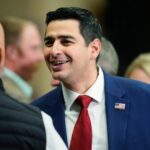
The most recent “Twitter Files” release, handled by independent journalist Matt Taibbi, revealed the extent to which the Federal Bureau of Investigation (FBI) routinely asked Twitter to take censorship actions against certain Twitter accounts, mostly citing concerns of election-related misinformation.
In the latest revelations, Taibbi suggested that the contact between Twitter and the FBI was so regular that it seemed as if Twitter had become a “subsidiary” of the government law enforcement agency.
Because of the nature of the revelations, which presumably were never meant for public consumption, conservative commentator and musician John Rich rhetorically asked how long it would take for the FBI to raid new Twitter owner Elon Musk’s home, which seemed to be a shot at the agency for the recent Mar-a-Lago raid.
“How long before the FBI raids @elonmusk’s home?” Rich tweeted Friday.
How long before the FBI raids @elonmusk ‘s home?
— John Rich🇺🇸 (@johnrich) December 17, 2022
Early Saturday morning, Musk responded to Rich’s tweet, writing, “I don’t have a home.”
I don’t have a home
— Elon Musk (@elonmusk) December 17, 2022
Could you see the FBI targeting Musk?
Yes: 98% (47 Votes)
No: 2% (1 Votes)
While Musk has the resources to have a home, his “homeless” housing situation is now widely known. According to a USA Today report from earlier this year, he told the non-profit organization TED that he doesn’t own a home and sleeps at friends’ houses.
“In fact, I don’t even own a home right now. I’m literally staying at friends’ places,” he said. “If I travel to the Bay Area, which is where most of Tesla engineering is, I basically rotate through friends’ spare bedrooms.”
The revelations from Taibbi’s reporting generated concerns and discussions regarding the types of accounts flagged by an internal FBI unit specializing in identifying what it believed to be harmful “misinformation,” mostly election-centered.
The government agency would routinely reach out to former Twitter Trust and Safety chief Yoel Roth and his team and in some cases, essentially order them to take actions against Twitter users, many of which were either satirical tweets or apparent jokes.
“4. Between January 2020 and November 2022, there were over 150 emails between the FBI and former Twitter Trust and Safety chief Yoel Roth,” Taibbi tweeted.
4. Between January 2020 and November 2022, there were over 150 emails between the FBI and former Twitter Trust and Safety chief Yoel Roth.
— Matt Taibbi (@mtaibbi) December 16, 2022
Taibbi noted that some of the emails between Twitter and the FBI were of no genuine concern but added that a “surprisingly high number” were centered around imploring Twitter to take censorship actions.
“6. But a surprisingly high number are requests by the FBI for Twitter to take action on election misinformation, even involving joke tweets from low-follower accounts,” Taibbi tweeted.
6. But a surprisingly high number are requests by the FBI for Twitter to take action on election misinformation, even involving joke tweets from low-follower accounts.
— Matt Taibbi (@mtaibbi) December 16, 2022
Taibbi went on to say that the relationship between the FBI and Twitter evolved into a type of “master-canine” situation, as the emails he revealed showed the FBI issuing what appeared to be orders to censor specific individuals, with the expectation that it was more than a friendly a request.
“‘HELLO TWITTER CONTACTS’: The master-canine quality of the FBI’s relationship to Twitter comes through in this November 2022 email, in which “FBI San Francisco is notifying you” it wants action on four accounts:” Taibbi tweeted, attaching an example of one of those types of emails.
“HELLO TWITTER CONTACTS”: The master-canine quality of the FBI’s relationship to Twitter comes through in this November 2022 email, in which “FBI San Francisco is notifying you” it wants action on four accounts: pic.twitter.com/LjgB6fxENo
— Matt Taibbi (@mtaibbi) December 16, 2022
Many Twitter users are anxious to view the upcoming “Twitter Files” batch involving communications between Dr. Anthony Fauci and Twitter during the height of the COVID-19 pandemic. Musk has hinted that such files are coming but hasn’t announced a date.






